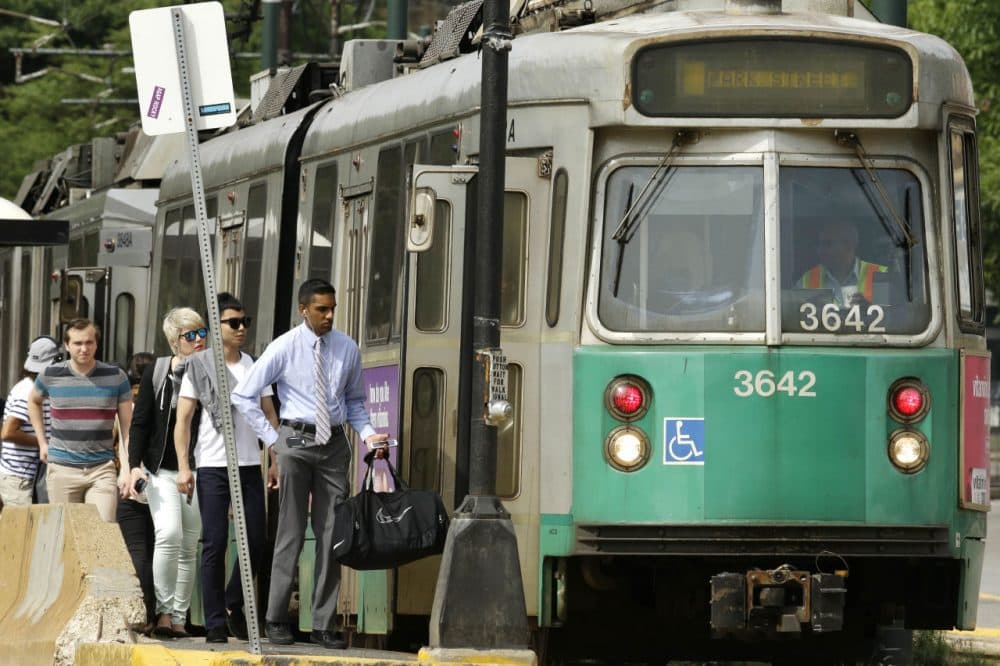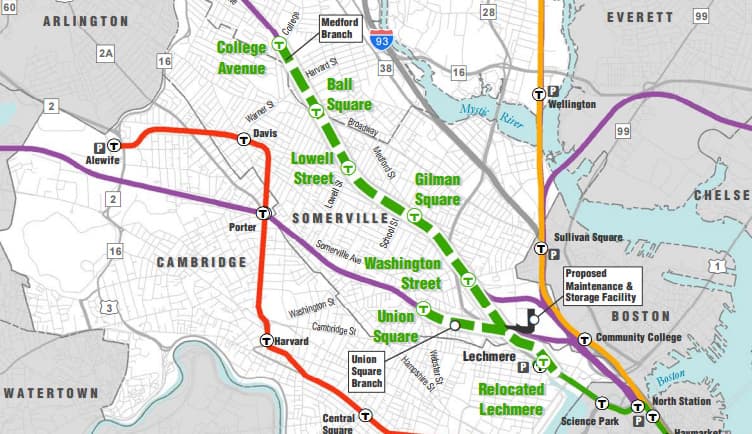Advertisement
MBTA Ending Several Contracts Associated With Green Line Extension Project

The MBTA is cutting ties with most of the firms it hired to work on the Green Line extension, as it looks for ways to cut costs so the project can move forward.
The transit agency announced in a press release Thursday that it was ending contracts with four firms, including general contractor White Skanska Kiewit (WSK). The agency also said it was restructuring the team of T employees overseeing the project, including appointing a new interim project manager.
"Today’s actions are necessary steps to resolving the future of the GLX project,” the chair of the T's control board, Joseph Aiello, said in a statement.
The fate of the Green Line extension to Somerville and Medford has been in question since it was revealed in August that it was projected to cost $3 billion to complete — $1 billion more than previously estimated.
"The decision marks the start of a transitional period, during which no new construction work will be awarded," the T said in a statement. "During this time, however, much of the construction work that is already under contract and in progress will continue."
The decision to cut ties with the current contractors is not a surprise. During a public meeting last week of the T's control board and the board of the state Department of Transportation, consultants tasked with figuring out what went wrong with the project said the T's failure to properly implement a new contracting process allowed WSK to negotiate to secure the highest price allowed for its work.
“WSK figured out how to work the system, we allowed them to work the system, and they ended up every time getting their maximum price,” Brian Lang, a member of the T’s fiscal control board, had said.

And during another meeting on Wednesday, the boards were presented with ideas for how to redesign and rebid the project to cut costs. Consultants hired to look at how the project could move forward suggested putting the remainder of the project out to bid as a single contract using a method known as “design-build.” The consultants said a test of the market showed there was significant interest from contractors to bid for the project under these new conditions and the new process could help "maximize cost certainty" and "shift reasonable risks to the private sector."
Rafael Mares is vice president at the Conservation Law Foundation, the group that sued the state, forcing it to commit to building the extension to mitigate the impacts of the Big Dig. He called the decision to end the contracts "the logical next step."
"We understand now that project delivery method that was used was deeply flawed, the way it was implemented, and the only reasonable next step is to exit that process and start a new one," Mares said.
Transportation Secretary Stephanie Pollack emphasized during Wednesday's meeting that canceling the project was still on the table — even though the state has already spent $380 million and would have to spend another $362 million before winding the project down.
“I think we have a lot of work to do to get the project to a place where we have the confidence of the administration, of the Legislature, and of these two boards in order to move forward,” she said.
Mares said that while canceling the contracts is consistent with both moving the project forward and potentially nixing it, he said the reasonable conclusion would be for the T to put the project out to bid again under a different contracting process.
"Considering there are $1 billion in federal funding riding on it and that this is a legal requirement ... and it’s a project that has such immense benefits and in a densely populated area," Mares said, "it strikes me as it’s very unlikely that the project wouldn’t go forward."
According to Thursday's statement, the T's control board believes that in order to continue the project the design must be "aggressively" adjusted, the T must determine an accurate budget and the best way to procure and deliver the project, as well as ensure sufficient funding.
Some design changes proposed during Wednesday's meeting include scaling back station designs, downsizing a planned vehicle maintenance facility and possibly replacing the proposed Union Square station with a commuter rail stop or shuttle bus to Lechmere.
Mares said Thursday he was pleased with some of those proposed design changes, but that any cost-saving measures should "hold the functionality of the system constant."
"So producing the same benefits to the public without having to have a price tag that is unreasonable," he said.
This article was originally published on December 10, 2015.
